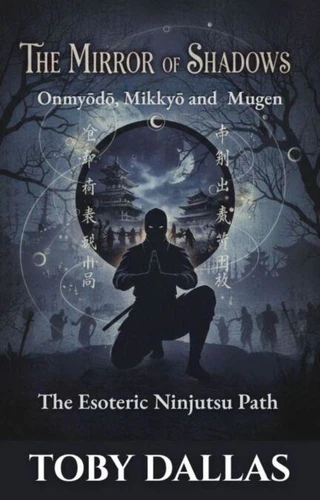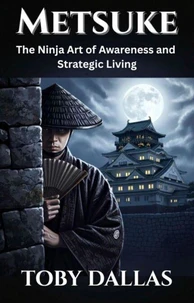Nouveauté
The Mirror of Shadows. Ninja Mastery, #5
Par :Formats :
Disponible dans votre compte client Decitre ou Furet du Nord dès validation de votre commande. Le format ePub est :
- Compatible avec une lecture sur My Vivlio (smartphone, tablette, ordinateur)
- Compatible avec une lecture sur liseuses Vivlio
- Pour les liseuses autres que Vivlio, vous devez utiliser le logiciel Adobe Digital Edition. Non compatible avec la lecture sur les liseuses Kindle, Remarkable et Sony
 , qui est-ce ?
, qui est-ce ?Notre partenaire de plateforme de lecture numérique où vous retrouverez l'ensemble de vos ebooks gratuitement
Pour en savoir plus sur nos ebooks, consultez notre aide en ligne ici
- FormatePub
- ISBN8232605933
- EAN9798232605933
- Date de parution20/10/2025
- Protection num.pas de protection
- Infos supplémentairesepub
- ÉditeurHamza elmir
Résumé
Mirror of Shadows: Onmyodo, Mikkyo and Mugen - The Esoteric Ninja PathHidden behind the legends of smoke and steel lies a deeper truth - the inner science of the shinobi mind. Mirror of Shadows traces the forgotten lineage of Japan's esoteric arts - from the mountain temples of the Yamabushi to the secret manuals of the shinobi - revealing how Onmyodo, Mikkyo, and Mugen (the Infinite) converged to form the psychological and spiritual foundation of ninjutsu.
Across three parts, this book unveils a hidden continuum of practice that transformed religion into perception, and perception into power: Part I - The Temple and the Mountain explores the origins of shinobi esotericism in the ritual technologies of Mikkyo Buddhism, the ascetic disciplines of Shugendo, and the cosmic harmonics of Onmyodo. Part II - The Shinobi's Internal Landscape shows how these sacred systems were distilled into the mental training of the operative - Kuji-in for cognitive focus, Go-shin-ho for psychological fortification, and the Bansenshukai's cosmology of concealment.
Part III - The Shadow's Psychology reveals how the mind itself became a weapon: invisibility as a state of consciousness, fear as a crafted architecture, and "Tenshin" - the Heavenly Mind - as the ultimate alignment with the flow of all things. Drawing from classical sources such as the Bansenshukai, Koyo Gunkan, and esoteric Buddhist and Onmyodo texts, this work bridges historical scholarship with cognitive science and symbolic interpretation.
Mirror of Shadows is not a manual of tricks, but a mirror - reflecting how the shinobi turned the chaos of the world into a geometry of calm, perception, and inevitability. For readers of esoteric philosophy, martial psychology, and the hidden spiritual traditions of Japan, this book illuminates how the true battlefield was never the night - but the mind itself.
Across three parts, this book unveils a hidden continuum of practice that transformed religion into perception, and perception into power: Part I - The Temple and the Mountain explores the origins of shinobi esotericism in the ritual technologies of Mikkyo Buddhism, the ascetic disciplines of Shugendo, and the cosmic harmonics of Onmyodo. Part II - The Shinobi's Internal Landscape shows how these sacred systems were distilled into the mental training of the operative - Kuji-in for cognitive focus, Go-shin-ho for psychological fortification, and the Bansenshukai's cosmology of concealment.
Part III - The Shadow's Psychology reveals how the mind itself became a weapon: invisibility as a state of consciousness, fear as a crafted architecture, and "Tenshin" - the Heavenly Mind - as the ultimate alignment with the flow of all things. Drawing from classical sources such as the Bansenshukai, Koyo Gunkan, and esoteric Buddhist and Onmyodo texts, this work bridges historical scholarship with cognitive science and symbolic interpretation.
Mirror of Shadows is not a manual of tricks, but a mirror - reflecting how the shinobi turned the chaos of the world into a geometry of calm, perception, and inevitability. For readers of esoteric philosophy, martial psychology, and the hidden spiritual traditions of Japan, this book illuminates how the true battlefield was never the night - but the mind itself.
Mirror of Shadows: Onmyodo, Mikkyo and Mugen - The Esoteric Ninja PathHidden behind the legends of smoke and steel lies a deeper truth - the inner science of the shinobi mind. Mirror of Shadows traces the forgotten lineage of Japan's esoteric arts - from the mountain temples of the Yamabushi to the secret manuals of the shinobi - revealing how Onmyodo, Mikkyo, and Mugen (the Infinite) converged to form the psychological and spiritual foundation of ninjutsu.
Across three parts, this book unveils a hidden continuum of practice that transformed religion into perception, and perception into power: Part I - The Temple and the Mountain explores the origins of shinobi esotericism in the ritual technologies of Mikkyo Buddhism, the ascetic disciplines of Shugendo, and the cosmic harmonics of Onmyodo. Part II - The Shinobi's Internal Landscape shows how these sacred systems were distilled into the mental training of the operative - Kuji-in for cognitive focus, Go-shin-ho for psychological fortification, and the Bansenshukai's cosmology of concealment.
Part III - The Shadow's Psychology reveals how the mind itself became a weapon: invisibility as a state of consciousness, fear as a crafted architecture, and "Tenshin" - the Heavenly Mind - as the ultimate alignment with the flow of all things. Drawing from classical sources such as the Bansenshukai, Koyo Gunkan, and esoteric Buddhist and Onmyodo texts, this work bridges historical scholarship with cognitive science and symbolic interpretation.
Mirror of Shadows is not a manual of tricks, but a mirror - reflecting how the shinobi turned the chaos of the world into a geometry of calm, perception, and inevitability. For readers of esoteric philosophy, martial psychology, and the hidden spiritual traditions of Japan, this book illuminates how the true battlefield was never the night - but the mind itself.
Across three parts, this book unveils a hidden continuum of practice that transformed religion into perception, and perception into power: Part I - The Temple and the Mountain explores the origins of shinobi esotericism in the ritual technologies of Mikkyo Buddhism, the ascetic disciplines of Shugendo, and the cosmic harmonics of Onmyodo. Part II - The Shinobi's Internal Landscape shows how these sacred systems were distilled into the mental training of the operative - Kuji-in for cognitive focus, Go-shin-ho for psychological fortification, and the Bansenshukai's cosmology of concealment.
Part III - The Shadow's Psychology reveals how the mind itself became a weapon: invisibility as a state of consciousness, fear as a crafted architecture, and "Tenshin" - the Heavenly Mind - as the ultimate alignment with the flow of all things. Drawing from classical sources such as the Bansenshukai, Koyo Gunkan, and esoteric Buddhist and Onmyodo texts, this work bridges historical scholarship with cognitive science and symbolic interpretation.
Mirror of Shadows is not a manual of tricks, but a mirror - reflecting how the shinobi turned the chaos of the world into a geometry of calm, perception, and inevitability. For readers of esoteric philosophy, martial psychology, and the hidden spiritual traditions of Japan, this book illuminates how the true battlefield was never the night - but the mind itself.






